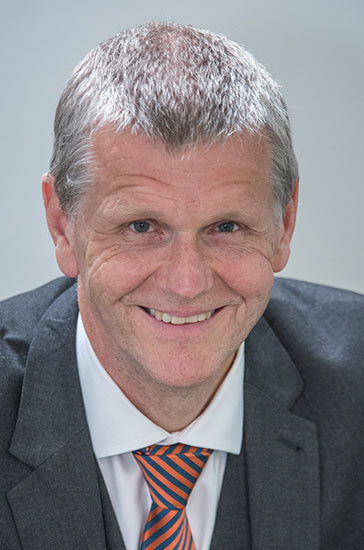
The clinical assessment component of the MRCGP examination has seen a lot of changes over recent years. When the pandemic brought an abrupt end to the in-person Clinical Skills Assessment (CSA), the College worked hard to deliver a new remote assessment - the Recorded Consultation Assessment (RCA) - in only 11 weeks, meaning that thousands of trainees were able to CCT as planned and provide a much-needed boost to the GP workforce during Covid-19.
The RCA was always intended to be a temporary measure and has now been replaced by the Simulated Consultation Assessment (SCA). Its launch marks a return to standardised assessment and an examination more tailored to the needs of trainees, trainers and patients than ever before.
Six months on from the first sittings last November, RCGP Chief Examiner and International Medical Director for Education and Training, Professor Rich Withnall, is confident that the SCA is performing well.

“Early results show it’s a valid and reliable assessment that will deliver the good doctors that the NHS so badly needs into the workforce, and most importantly, help ensure patient safety,” he says.
Rich’s SCA Development Team oversaw the consultation, design, piloting and launch of the SCA, which was three years in the making. Extensive stakeholder engagement was undertaken with 3,159 responses from trainees, First5s, GP Trainers, RCGP Examiners and stakeholder groups including the BMA, BAPIO, BIDA, the Christian Medical Fellowship, the Muslim Doctors’ Association, the Disabled Doctors Network and the Medical Women’s Federation.
“It was important to consult widely because the SCA is part of the UK’s general practice licensing examination, so we needed a solution that is fair for all candidates,” says Rich.
“We learned that most respondents wanted to go back to standardised cases, to have role-players instead of real patients, and that for some trainees who are neurodivergent, 10 mins was too short a time to deal with complex cases. We addressed all these issues – and more - in the design of the SCA.”
Rich cites seven key benefits of the SCA: improved reliability, validity, sustainability and availability; less trainee and trainer preparation; quicker delivery of results, and enhanced quality assurance.
“The fact that the examination is undertaken in trainees' surgeries not only saves our candidates time and travelling and accommodation expenses in comparison with the CSA, but it’s now much more sustainable – we’ve reduced its carbon footprint by 4.5 times! And by using standardised cases that test the skills GPs use in actual consultations, we have an assessment that’s both reliable and valid,” he says.
“It’s early days, but currently our reliability coefficients are the highest of this sort of examination. The GMC considers that in terms of reliability rates, anything above 0.7 is good – we’re far in excess of 0.8.
“And in terms of validity, we changed the marking domains so we can test essential data gathering and diagnostic skills, ethics and patient-centered care, and how trainees relate to other professionals.”
So far there have been five examination diets, and 2,523 candidates have completed the assessment, with pass rates showing a steady increase – an expected trend, as Rich explains.
“The SCA is a return to standardised assessment after the RCA, so we’ve spent a lot of time and effort communicating about what the examination is, and how it will function. Since its launch in November, trainees and trainers have become more familiar with the SCA modality and what it is we’re looking for, which I think is reflected in the upward pass rate.”
However, despite increasing familiarity with the SCA, there are still examples of trainees not being aware of regulations, policies and examination preparation materials – including information about reasonable adjustments - on the College website, and Rich is keen to stress that this remains the single source of truth for information about the examination.
“Before we even knew what would be in the SCA, there was a lot of speculation and false assumptions from commercial companies and others about what it would be, and what trainees should expect, which wasn’t helpful to our candidates.”
These concerns were amplified when a Europe-wide tech outage last November caused 83 candidates in the first SCA cohort to be unable to complete their assessment.
The incident was caused by a third-party provider and impacted every user of its European servers, including Amazon. The College has since introduced additional measures to guard against anything similar happening in future, including not being able to communicate with trainees during the examination, and a learning review is underway to capture any additional actions that could provide greater resilience in future.
“No one could have foreseen the tech outage, and all those affected have now sat the examination, but it was very stressful and upsetting for all trainees involved that afternoon, and we remain very sorry,” says Rich. “We’ve learned and made changes, and we’re very confident in the reliability of the examination.”
The completion rate for the first six diets bears out the robustness of the platform – except for the outage incident in November, which had a completion rate of 97%, all other diets have seen a completion rate in excess of 99%.
A survey of trainees who sat the January SCA reflects a high level of positivity around the assessment, with 83% saying they were satisfied with their overall experience of the SCA.
It has also received good feedback from external stakeholders, including the GMC and other Royal Colleges.
“Of course, there are still things we need to improve. Our candidates would expect us to listen, learn and adjust things when appropriate. Overall though, the examination is bedding-in really well.”
This includes changes to the online platform that allows trainees to reserve places – around a quarter are reserving but not completing their bookings, preventing other trainees from booking places. The College is working with the training community and platform developers to address this.
“We’re also aware that some candidates are anxious about recent changes to the publication of the BNF. Although paper copies of the BNF may still be taken into the examination room if candidates so wish, I’d like to reassure candidates that BNF access is not required to pass any of the SCA cases.”
Rich has two "top tips" for trainees planning to sit the SCA.
“Firstly, see lots of real patients - this is better preparation than expensive preparatory courses or textbooks.
“Secondly, make sure that you are experienced in consulting in 12 minutes – when candidates run out of time, it’s often because they spend too long on data gathering and diagnosis, so they tend to score less well in clinical management and medical complexity.”
While he points out that there will always be room for improvement, Rich is satisfied that the SCA is delivering on its purpose of producing good doctors and ensuring patient safety.
“I’m very proud of the SCA, and all those involved in creating it. I’d also like to thank the amazing Panel of Examiners and the committed and totally dedicated Examinations team within the College led by Stuart Copus. Without their expertise, diligence and fair assessments in support of patient safety, candidates would be unable to move competently and confidently into safe independent practice and enjoy all the benefits that a rewarding career as a GP can offer.”
Read more

Thank you for your feedback. Your response will help improve this page.



